Entrepreneurship Skills for Successful Business Ventures Report
VerifiedAdded on 2020/07/22
|18
|5478
|57
Report
AI Summary
This report delves into the significance of entrepreneurship for economic growth, emphasizing the crucial role of entrepreneurial skills in fostering organizational development. It explores various types of entrepreneurship, including startup, small business, social, and large company ventures, examining their distinct characteristics and objectives. The report assesses the impact of small businesses on the UK economy, considering the implications of Brexit and its effects on economic growth and business opportunities. It also highlights the contributions of small businesses to social economy and discusses the traits of successful entrepreneurs and the importance of an entrepreneurial mindset, along with the influence of background on entrepreneurship. The analysis provides insights into the challenges and opportunities faced by entrepreneurs in the current business environment and emphasizes the importance of entrepreneurial skills for success.

ENTREPRENERUSHIP
Paraphrase This Document
Need a fresh take? Get an instant paraphrase of this document with our AI Paraphraser
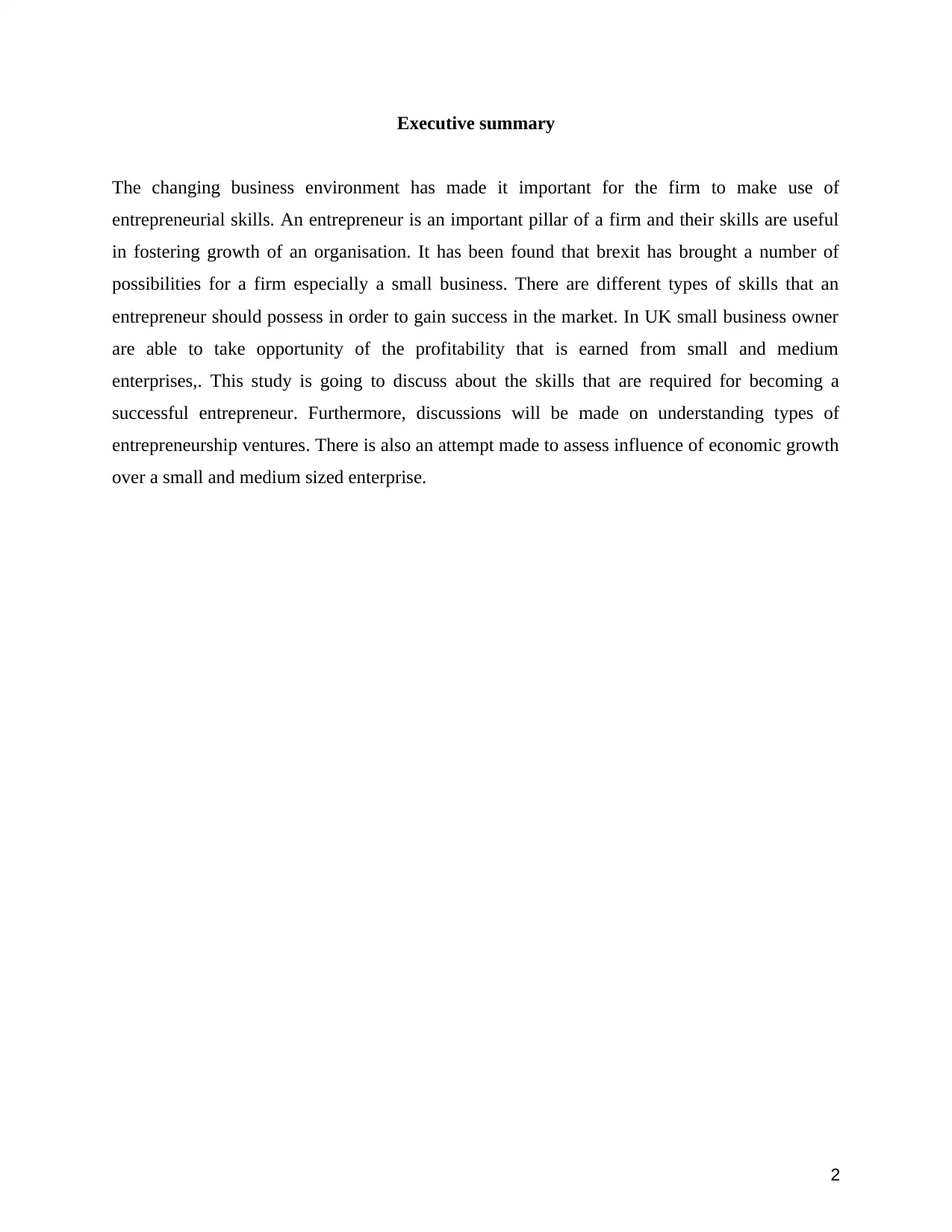
Executive summary
The changing business environment has made it important for the firm to make use of
entrepreneurial skills. An entrepreneur is an important pillar of a firm and their skills are useful
in fostering growth of an organisation. It has been found that brexit has brought a number of
possibilities for a firm especially a small business. There are different types of skills that an
entrepreneur should possess in order to gain success in the market. In UK small business owner
are able to take opportunity of the profitability that is earned from small and medium
enterprises,. This study is going to discuss about the skills that are required for becoming a
successful entrepreneur. Furthermore, discussions will be made on understanding types of
entrepreneurship ventures. There is also an attempt made to assess influence of economic growth
over a small and medium sized enterprise.
2
The changing business environment has made it important for the firm to make use of
entrepreneurial skills. An entrepreneur is an important pillar of a firm and their skills are useful
in fostering growth of an organisation. It has been found that brexit has brought a number of
possibilities for a firm especially a small business. There are different types of skills that an
entrepreneur should possess in order to gain success in the market. In UK small business owner
are able to take opportunity of the profitability that is earned from small and medium
enterprises,. This study is going to discuss about the skills that are required for becoming a
successful entrepreneur. Furthermore, discussions will be made on understanding types of
entrepreneurship ventures. There is also an attempt made to assess influence of economic growth
over a small and medium sized enterprise.
2
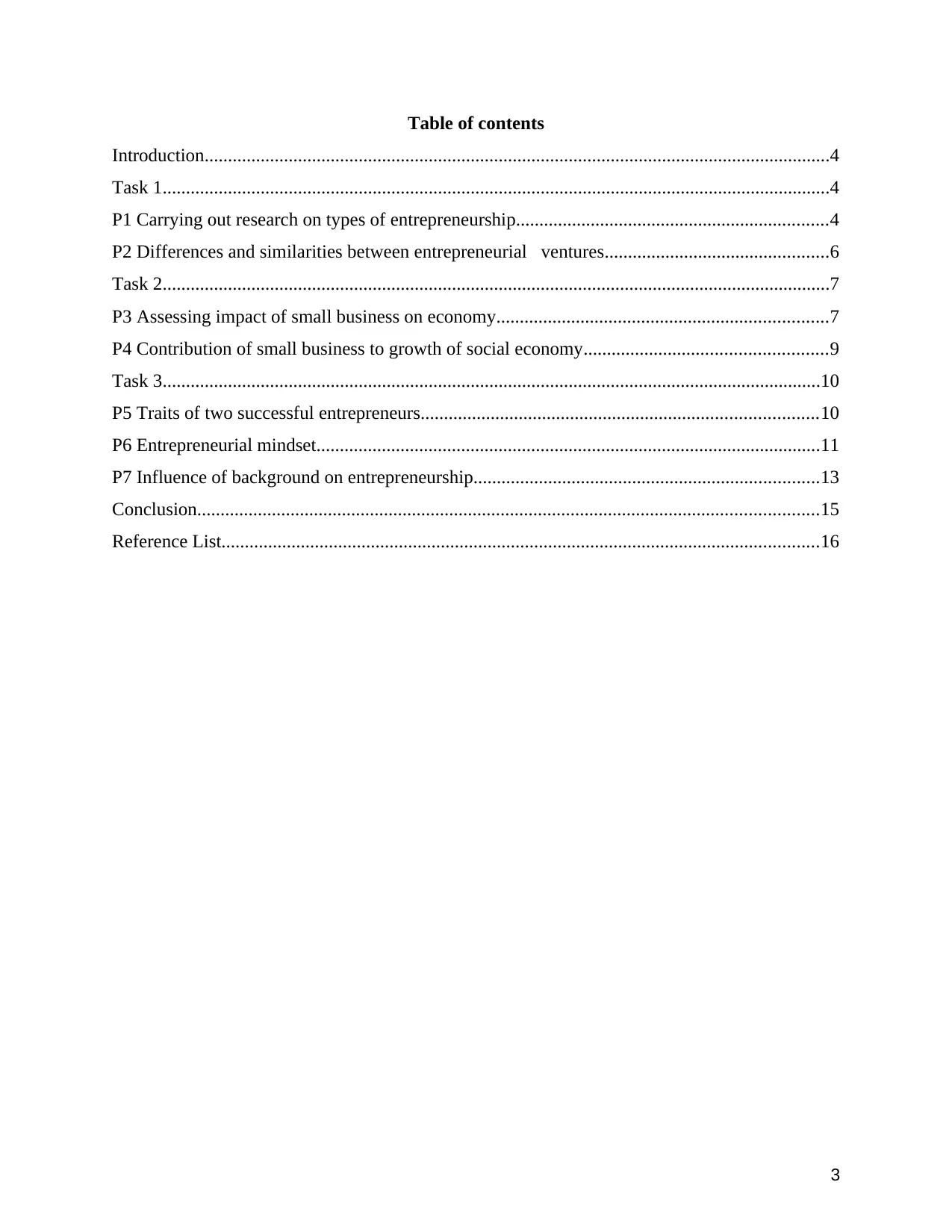
Table of contents
Introduction......................................................................................................................................4
Task 1...............................................................................................................................................4
P1 Carrying out research on types of entrepreneurship...................................................................4
P2 Differences and similarities between entrepreneurial ventures................................................6
Task 2...............................................................................................................................................7
P3 Assessing impact of small business on economy.......................................................................7
P4 Contribution of small business to growth of social economy....................................................9
Task 3.............................................................................................................................................10
P5 Traits of two successful entrepreneurs.....................................................................................10
P6 Entrepreneurial mindset............................................................................................................11
P7 Influence of background on entrepreneurship..........................................................................13
Conclusion.....................................................................................................................................15
Reference List................................................................................................................................16
3
Introduction......................................................................................................................................4
Task 1...............................................................................................................................................4
P1 Carrying out research on types of entrepreneurship...................................................................4
P2 Differences and similarities between entrepreneurial ventures................................................6
Task 2...............................................................................................................................................7
P3 Assessing impact of small business on economy.......................................................................7
P4 Contribution of small business to growth of social economy....................................................9
Task 3.............................................................................................................................................10
P5 Traits of two successful entrepreneurs.....................................................................................10
P6 Entrepreneurial mindset............................................................................................................11
P7 Influence of background on entrepreneurship..........................................................................13
Conclusion.....................................................................................................................................15
Reference List................................................................................................................................16
3
⊘ This is a preview!⊘
Do you want full access?
Subscribe today to unlock all pages.

Trusted by 1+ million students worldwide
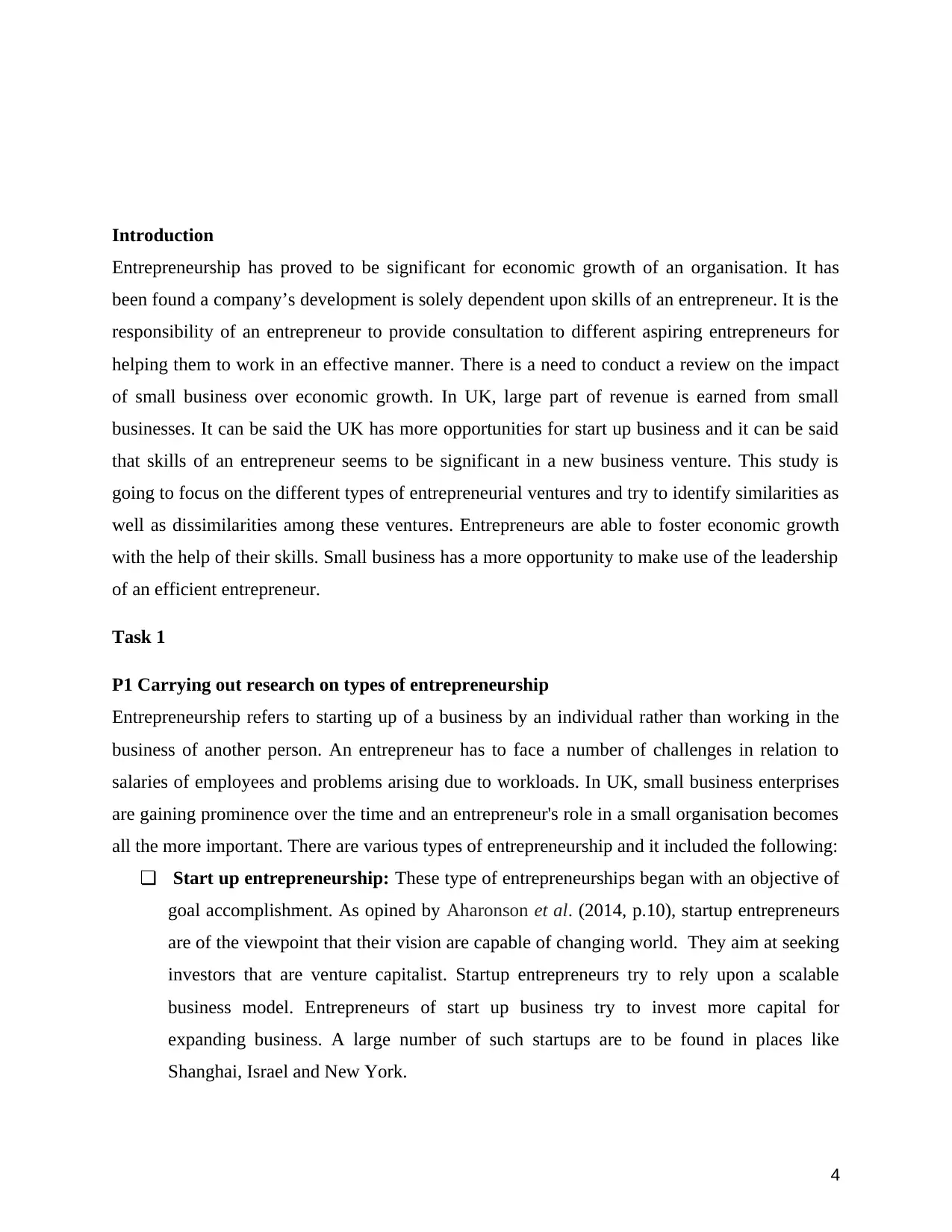
Introduction
Entrepreneurship has proved to be significant for economic growth of an organisation. It has
been found a company’s development is solely dependent upon skills of an entrepreneur. It is the
responsibility of an entrepreneur to provide consultation to different aspiring entrepreneurs for
helping them to work in an effective manner. There is a need to conduct a review on the impact
of small business over economic growth. In UK, large part of revenue is earned from small
businesses. It can be said the UK has more opportunities for start up business and it can be said
that skills of an entrepreneur seems to be significant in a new business venture. This study is
going to focus on the different types of entrepreneurial ventures and try to identify similarities as
well as dissimilarities among these ventures. Entrepreneurs are able to foster economic growth
with the help of their skills. Small business has a more opportunity to make use of the leadership
of an efficient entrepreneur.
Task 1
P1 Carrying out research on types of entrepreneurship
Entrepreneurship refers to starting up of a business by an individual rather than working in the
business of another person. An entrepreneur has to face a number of challenges in relation to
salaries of employees and problems arising due to workloads. In UK, small business enterprises
are gaining prominence over the time and an entrepreneur's role in a small organisation becomes
all the more important. There are various types of entrepreneurship and it included the following:
❏ Start up entrepreneurship: These type of entrepreneurships began with an objective of
goal accomplishment. As opined by Aharonson et al. (2014, p.10), startup entrepreneurs
are of the viewpoint that their vision are capable of changing world. They aim at seeking
investors that are venture capitalist. Startup entrepreneurs try to rely upon a scalable
business model. Entrepreneurs of start up business try to invest more capital for
expanding business. A large number of such startups are to be found in places like
Shanghai, Israel and New York.
4
Entrepreneurship has proved to be significant for economic growth of an organisation. It has
been found a company’s development is solely dependent upon skills of an entrepreneur. It is the
responsibility of an entrepreneur to provide consultation to different aspiring entrepreneurs for
helping them to work in an effective manner. There is a need to conduct a review on the impact
of small business over economic growth. In UK, large part of revenue is earned from small
businesses. It can be said the UK has more opportunities for start up business and it can be said
that skills of an entrepreneur seems to be significant in a new business venture. This study is
going to focus on the different types of entrepreneurial ventures and try to identify similarities as
well as dissimilarities among these ventures. Entrepreneurs are able to foster economic growth
with the help of their skills. Small business has a more opportunity to make use of the leadership
of an efficient entrepreneur.
Task 1
P1 Carrying out research on types of entrepreneurship
Entrepreneurship refers to starting up of a business by an individual rather than working in the
business of another person. An entrepreneur has to face a number of challenges in relation to
salaries of employees and problems arising due to workloads. In UK, small business enterprises
are gaining prominence over the time and an entrepreneur's role in a small organisation becomes
all the more important. There are various types of entrepreneurship and it included the following:
❏ Start up entrepreneurship: These type of entrepreneurships began with an objective of
goal accomplishment. As opined by Aharonson et al. (2014, p.10), startup entrepreneurs
are of the viewpoint that their vision are capable of changing world. They aim at seeking
investors that are venture capitalist. Startup entrepreneurs try to rely upon a scalable
business model. Entrepreneurs of start up business try to invest more capital for
expanding business. A large number of such startups are to be found in places like
Shanghai, Israel and New York.
4
Paraphrase This Document
Need a fresh take? Get an instant paraphrase of this document with our AI Paraphraser
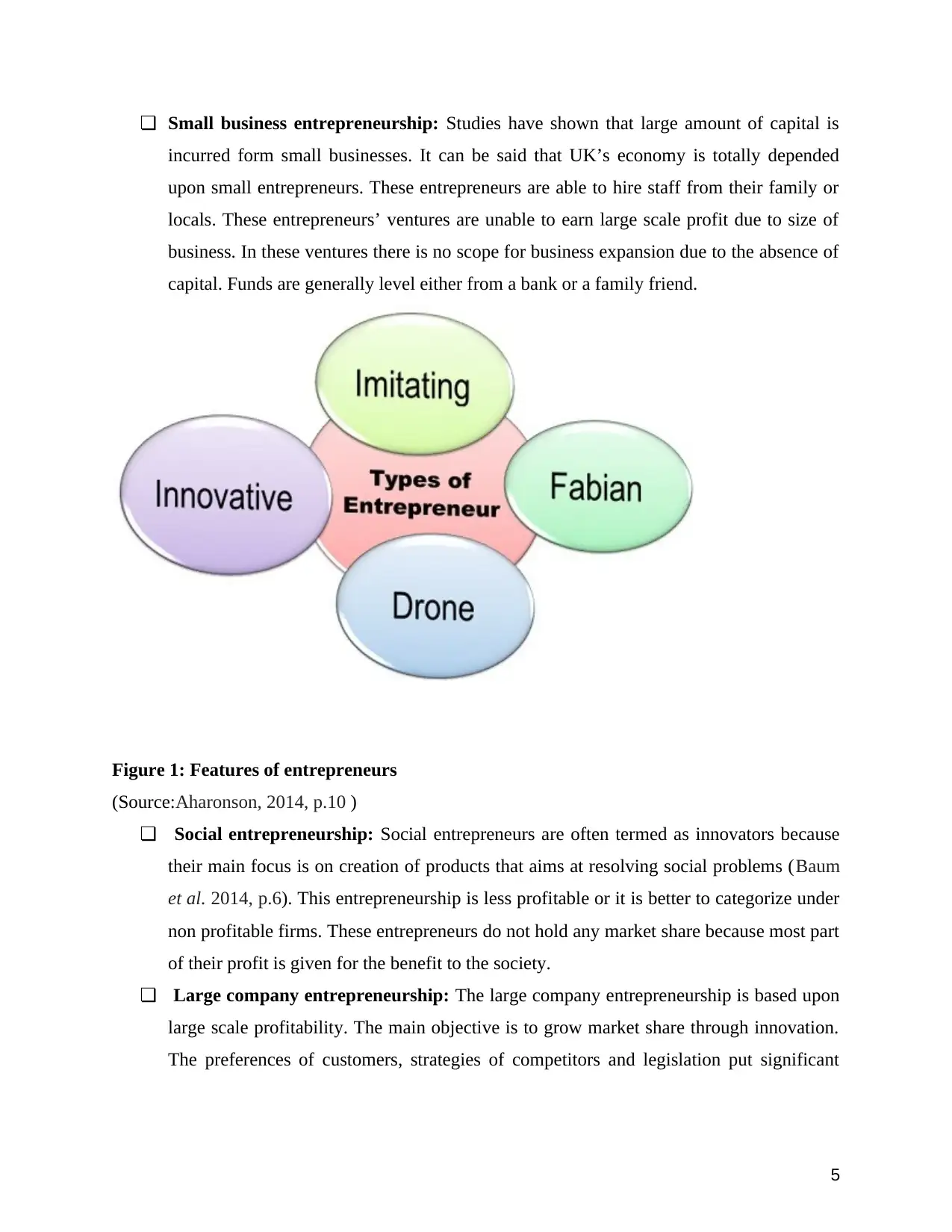
❏ Small business entrepreneurship: Studies have shown that large amount of capital is
incurred form small businesses. It can be said that UK’s economy is totally depended
upon small entrepreneurs. These entrepreneurs are able to hire staff from their family or
locals. These entrepreneurs’ ventures are unable to earn large scale profit due to size of
business. In these ventures there is no scope for business expansion due to the absence of
capital. Funds are generally level either from a bank or a family friend.
Figure 1: Features of entrepreneurs
(Source:Aharonson, 2014, p.10 )
❏ Social entrepreneurship: Social entrepreneurs are often termed as innovators because
their main focus is on creation of products that aims at resolving social problems (Baum
et al. 2014, p.6). This entrepreneurship is less profitable or it is better to categorize under
non profitable firms. These entrepreneurs do not hold any market share because most part
of their profit is given for the benefit to the society.
❏ Large company entrepreneurship: The large company entrepreneurship is based upon
large scale profitability. The main objective is to grow market share through innovation.
The preferences of customers, strategies of competitors and legislation put significant
5
incurred form small businesses. It can be said that UK’s economy is totally depended
upon small entrepreneurs. These entrepreneurs are able to hire staff from their family or
locals. These entrepreneurs’ ventures are unable to earn large scale profit due to size of
business. In these ventures there is no scope for business expansion due to the absence of
capital. Funds are generally level either from a bank or a family friend.
Figure 1: Features of entrepreneurs
(Source:Aharonson, 2014, p.10 )
❏ Social entrepreneurship: Social entrepreneurs are often termed as innovators because
their main focus is on creation of products that aims at resolving social problems (Baum
et al. 2014, p.6). This entrepreneurship is less profitable or it is better to categorize under
non profitable firms. These entrepreneurs do not hold any market share because most part
of their profit is given for the benefit to the society.
❏ Large company entrepreneurship: The large company entrepreneurship is based upon
large scale profitability. The main objective is to grow market share through innovation.
The preferences of customers, strategies of competitors and legislation put significant
5
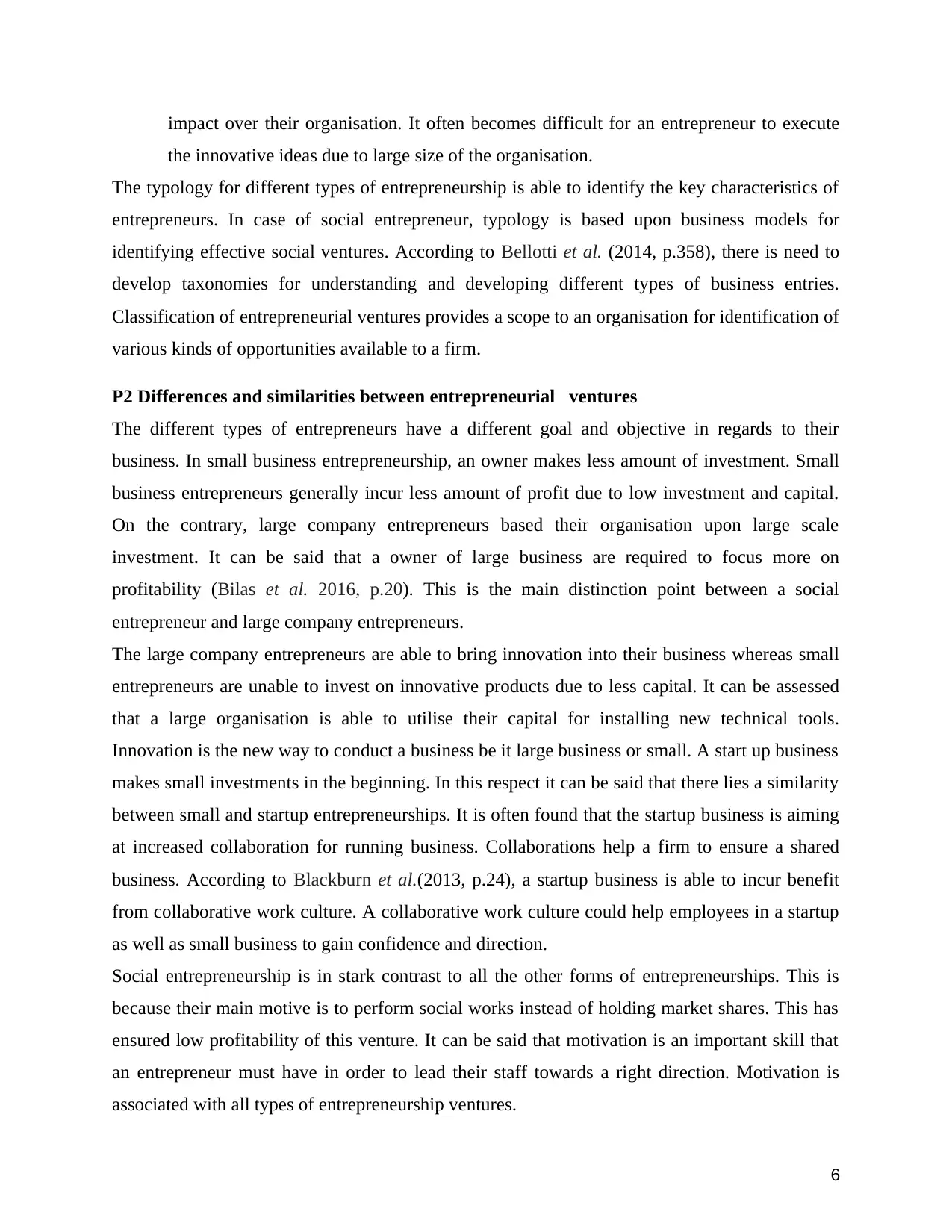
impact over their organisation. It often becomes difficult for an entrepreneur to execute
the innovative ideas due to large size of the organisation.
The typology for different types of entrepreneurship is able to identify the key characteristics of
entrepreneurs. In case of social entrepreneur, typology is based upon business models for
identifying effective social ventures. According to Bellotti et al. (2014, p.358), there is need to
develop taxonomies for understanding and developing different types of business entries.
Classification of entrepreneurial ventures provides a scope to an organisation for identification of
various kinds of opportunities available to a firm.
P2 Differences and similarities between entrepreneurial ventures
The different types of entrepreneurs have a different goal and objective in regards to their
business. In small business entrepreneurship, an owner makes less amount of investment. Small
business entrepreneurs generally incur less amount of profit due to low investment and capital.
On the contrary, large company entrepreneurs based their organisation upon large scale
investment. It can be said that a owner of large business are required to focus more on
profitability (Bilas et al. 2016, p.20). This is the main distinction point between a social
entrepreneur and large company entrepreneurs.
The large company entrepreneurs are able to bring innovation into their business whereas small
entrepreneurs are unable to invest on innovative products due to less capital. It can be assessed
that a large organisation is able to utilise their capital for installing new technical tools.
Innovation is the new way to conduct a business be it large business or small. A start up business
makes small investments in the beginning. In this respect it can be said that there lies a similarity
between small and startup entrepreneurships. It is often found that the startup business is aiming
at increased collaboration for running business. Collaborations help a firm to ensure a shared
business. According to Blackburn et al.(2013, p.24), a startup business is able to incur benefit
from collaborative work culture. A collaborative work culture could help employees in a startup
as well as small business to gain confidence and direction.
Social entrepreneurship is in stark contrast to all the other forms of entrepreneurships. This is
because their main motive is to perform social works instead of holding market shares. This has
ensured low profitability of this venture. It can be said that motivation is an important skill that
an entrepreneur must have in order to lead their staff towards a right direction. Motivation is
associated with all types of entrepreneurship ventures.
6
the innovative ideas due to large size of the organisation.
The typology for different types of entrepreneurship is able to identify the key characteristics of
entrepreneurs. In case of social entrepreneur, typology is based upon business models for
identifying effective social ventures. According to Bellotti et al. (2014, p.358), there is need to
develop taxonomies for understanding and developing different types of business entries.
Classification of entrepreneurial ventures provides a scope to an organisation for identification of
various kinds of opportunities available to a firm.
P2 Differences and similarities between entrepreneurial ventures
The different types of entrepreneurs have a different goal and objective in regards to their
business. In small business entrepreneurship, an owner makes less amount of investment. Small
business entrepreneurs generally incur less amount of profit due to low investment and capital.
On the contrary, large company entrepreneurs based their organisation upon large scale
investment. It can be said that a owner of large business are required to focus more on
profitability (Bilas et al. 2016, p.20). This is the main distinction point between a social
entrepreneur and large company entrepreneurs.
The large company entrepreneurs are able to bring innovation into their business whereas small
entrepreneurs are unable to invest on innovative products due to less capital. It can be assessed
that a large organisation is able to utilise their capital for installing new technical tools.
Innovation is the new way to conduct a business be it large business or small. A start up business
makes small investments in the beginning. In this respect it can be said that there lies a similarity
between small and startup entrepreneurships. It is often found that the startup business is aiming
at increased collaboration for running business. Collaborations help a firm to ensure a shared
business. According to Blackburn et al.(2013, p.24), a startup business is able to incur benefit
from collaborative work culture. A collaborative work culture could help employees in a startup
as well as small business to gain confidence and direction.
Social entrepreneurship is in stark contrast to all the other forms of entrepreneurships. This is
because their main motive is to perform social works instead of holding market shares. This has
ensured low profitability of this venture. It can be said that motivation is an important skill that
an entrepreneur must have in order to lead their staff towards a right direction. Motivation is
associated with all types of entrepreneurship ventures.
6
⊘ This is a preview!⊘
Do you want full access?
Subscribe today to unlock all pages.

Trusted by 1+ million students worldwide
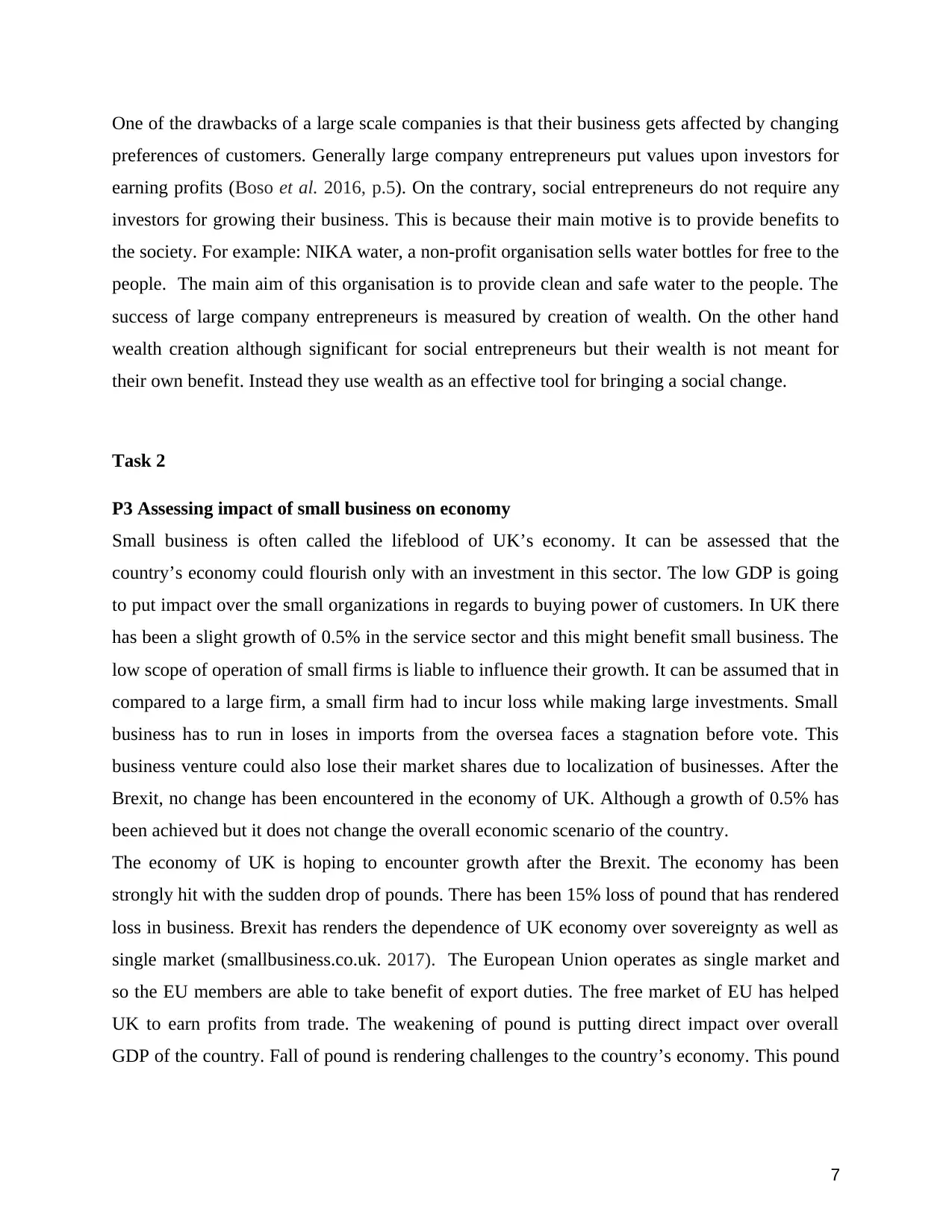
One of the drawbacks of a large scale companies is that their business gets affected by changing
preferences of customers. Generally large company entrepreneurs put values upon investors for
earning profits (Boso et al. 2016, p.5). On the contrary, social entrepreneurs do not require any
investors for growing their business. This is because their main motive is to provide benefits to
the society. For example: NIKA water, a non-profit organisation sells water bottles for free to the
people. The main aim of this organisation is to provide clean and safe water to the people. The
success of large company entrepreneurs is measured by creation of wealth. On the other hand
wealth creation although significant for social entrepreneurs but their wealth is not meant for
their own benefit. Instead they use wealth as an effective tool for bringing a social change.
Task 2
P3 Assessing impact of small business on economy
Small business is often called the lifeblood of UK’s economy. It can be assessed that the
country’s economy could flourish only with an investment in this sector. The low GDP is going
to put impact over the small organizations in regards to buying power of customers. In UK there
has been a slight growth of 0.5% in the service sector and this might benefit small business. The
low scope of operation of small firms is liable to influence their growth. It can be assumed that in
compared to a large firm, a small firm had to incur loss while making large investments. Small
business has to run in loses in imports from the oversea faces a stagnation before vote. This
business venture could also lose their market shares due to localization of businesses. After the
Brexit, no change has been encountered in the economy of UK. Although a growth of 0.5% has
been achieved but it does not change the overall economic scenario of the country.
The economy of UK is hoping to encounter growth after the Brexit. The economy has been
strongly hit with the sudden drop of pounds. There has been 15% loss of pound that has rendered
loss in business. Brexit has renders the dependence of UK economy over sovereignty as well as
single market (smallbusiness.co.uk. 2017). The European Union operates as single market and
so the EU members are able to take benefit of export duties. The free market of EU has helped
UK to earn profits from trade. The weakening of pound is putting direct impact over overall
GDP of the country. Fall of pound is rendering challenges to the country’s economy. This pound
7
preferences of customers. Generally large company entrepreneurs put values upon investors for
earning profits (Boso et al. 2016, p.5). On the contrary, social entrepreneurs do not require any
investors for growing their business. This is because their main motive is to provide benefits to
the society. For example: NIKA water, a non-profit organisation sells water bottles for free to the
people. The main aim of this organisation is to provide clean and safe water to the people. The
success of large company entrepreneurs is measured by creation of wealth. On the other hand
wealth creation although significant for social entrepreneurs but their wealth is not meant for
their own benefit. Instead they use wealth as an effective tool for bringing a social change.
Task 2
P3 Assessing impact of small business on economy
Small business is often called the lifeblood of UK’s economy. It can be assessed that the
country’s economy could flourish only with an investment in this sector. The low GDP is going
to put impact over the small organizations in regards to buying power of customers. In UK there
has been a slight growth of 0.5% in the service sector and this might benefit small business. The
low scope of operation of small firms is liable to influence their growth. It can be assumed that in
compared to a large firm, a small firm had to incur loss while making large investments. Small
business has to run in loses in imports from the oversea faces a stagnation before vote. This
business venture could also lose their market shares due to localization of businesses. After the
Brexit, no change has been encountered in the economy of UK. Although a growth of 0.5% has
been achieved but it does not change the overall economic scenario of the country.
The economy of UK is hoping to encounter growth after the Brexit. The economy has been
strongly hit with the sudden drop of pounds. There has been 15% loss of pound that has rendered
loss in business. Brexit has renders the dependence of UK economy over sovereignty as well as
single market (smallbusiness.co.uk. 2017). The European Union operates as single market and
so the EU members are able to take benefit of export duties. The free market of EU has helped
UK to earn profits from trade. The weakening of pound is putting direct impact over overall
GDP of the country. Fall of pound is rendering challenges to the country’s economy. This pound
7
Paraphrase This Document
Need a fresh take? Get an instant paraphrase of this document with our AI Paraphraser
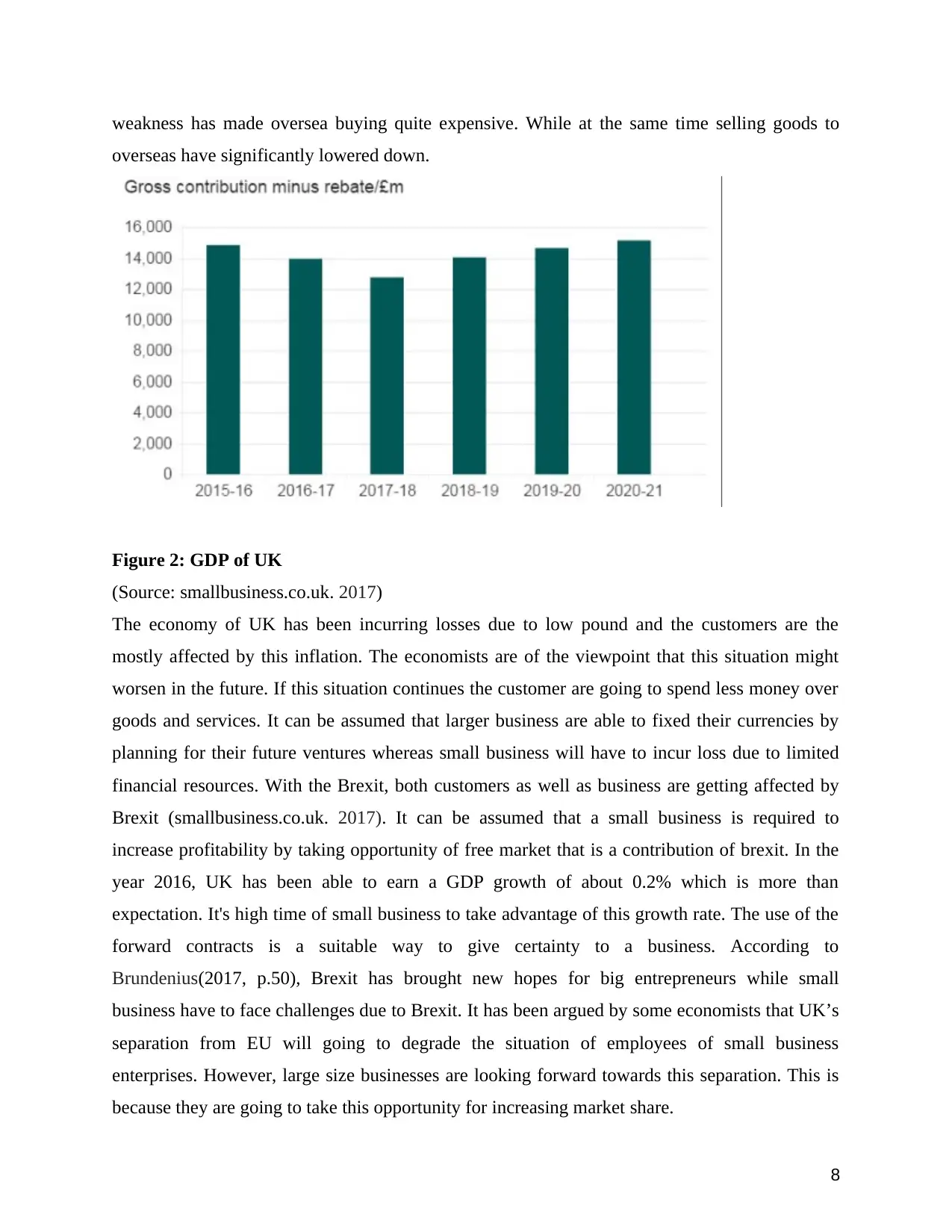
weakness has made oversea buying quite expensive. While at the same time selling goods to
overseas have significantly lowered down.
Figure 2: GDP of UK
(Source: smallbusiness.co.uk. 2017)
The economy of UK has been incurring losses due to low pound and the customers are the
mostly affected by this inflation. The economists are of the viewpoint that this situation might
worsen in the future. If this situation continues the customer are going to spend less money over
goods and services. It can be assumed that larger business are able to fixed their currencies by
planning for their future ventures whereas small business will have to incur loss due to limited
financial resources. With the Brexit, both customers as well as business are getting affected by
Brexit (smallbusiness.co.uk. 2017). It can be assumed that a small business is required to
increase profitability by taking opportunity of free market that is a contribution of brexit. In the
year 2016, UK has been able to earn a GDP growth of about 0.2% which is more than
expectation. It's high time of small business to take advantage of this growth rate. The use of the
forward contracts is a suitable way to give certainty to a business. According to
Brundenius(2017, p.50), Brexit has brought new hopes for big entrepreneurs while small
business have to face challenges due to Brexit. It has been argued by some economists that UK’s
separation from EU will going to degrade the situation of employees of small business
enterprises. However, large size businesses are looking forward towards this separation. This is
because they are going to take this opportunity for increasing market share.
8
overseas have significantly lowered down.
Figure 2: GDP of UK
(Source: smallbusiness.co.uk. 2017)
The economy of UK has been incurring losses due to low pound and the customers are the
mostly affected by this inflation. The economists are of the viewpoint that this situation might
worsen in the future. If this situation continues the customer are going to spend less money over
goods and services. It can be assumed that larger business are able to fixed their currencies by
planning for their future ventures whereas small business will have to incur loss due to limited
financial resources. With the Brexit, both customers as well as business are getting affected by
Brexit (smallbusiness.co.uk. 2017). It can be assumed that a small business is required to
increase profitability by taking opportunity of free market that is a contribution of brexit. In the
year 2016, UK has been able to earn a GDP growth of about 0.2% which is more than
expectation. It's high time of small business to take advantage of this growth rate. The use of the
forward contracts is a suitable way to give certainty to a business. According to
Brundenius(2017, p.50), Brexit has brought new hopes for big entrepreneurs while small
business have to face challenges due to Brexit. It has been argued by some economists that UK’s
separation from EU will going to degrade the situation of employees of small business
enterprises. However, large size businesses are looking forward towards this separation. This is
because they are going to take this opportunity for increasing market share.
8
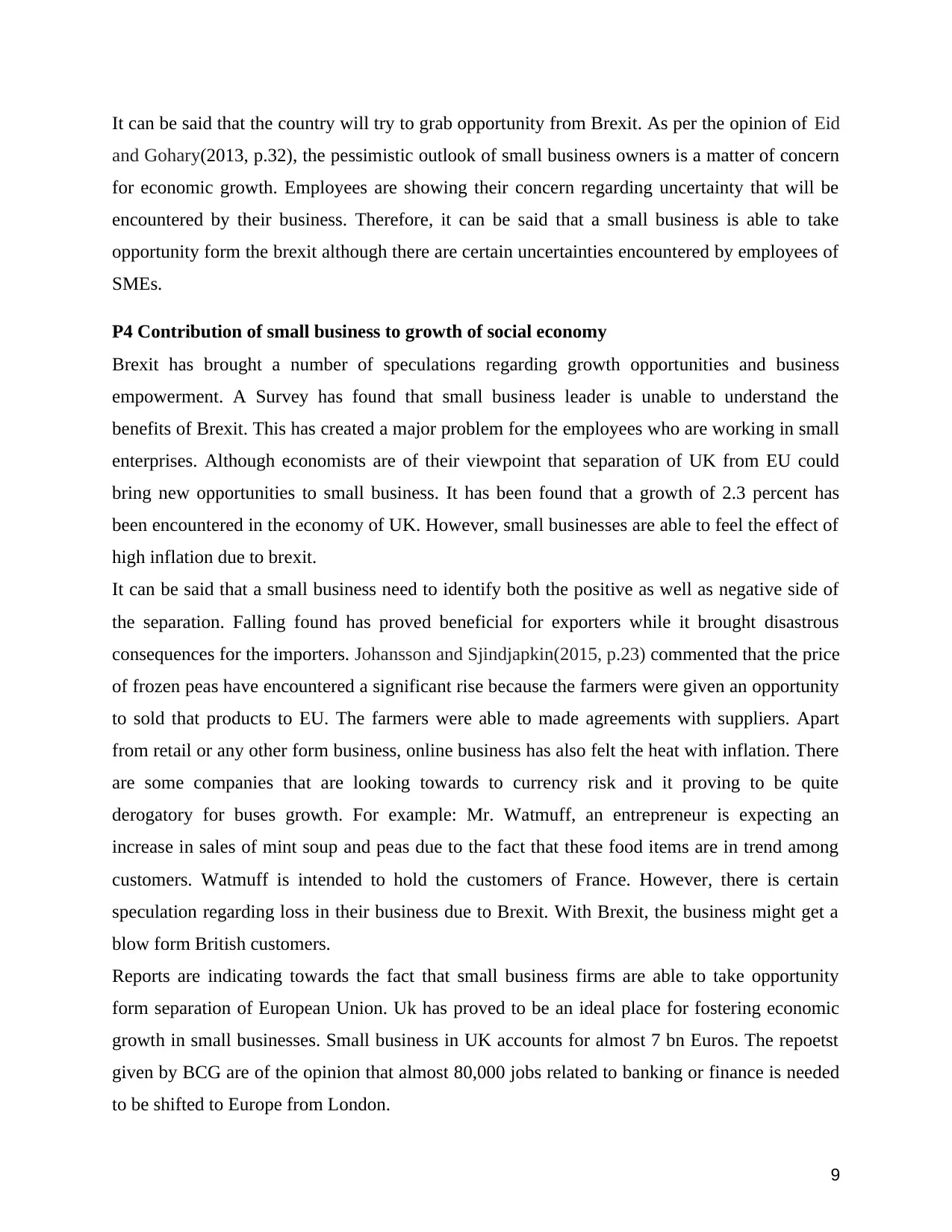
It can be said that the country will try to grab opportunity from Brexit. As per the opinion of Eid
and Gohary(2013, p.32), the pessimistic outlook of small business owners is a matter of concern
for economic growth. Employees are showing their concern regarding uncertainty that will be
encountered by their business. Therefore, it can be said that a small business is able to take
opportunity form the brexit although there are certain uncertainties encountered by employees of
SMEs.
P4 Contribution of small business to growth of social economy
Brexit has brought a number of speculations regarding growth opportunities and business
empowerment. A Survey has found that small business leader is unable to understand the
benefits of Brexit. This has created a major problem for the employees who are working in small
enterprises. Although economists are of their viewpoint that separation of UK from EU could
bring new opportunities to small business. It has been found that a growth of 2.3 percent has
been encountered in the economy of UK. However, small businesses are able to feel the effect of
high inflation due to brexit.
It can be said that a small business need to identify both the positive as well as negative side of
the separation. Falling found has proved beneficial for exporters while it brought disastrous
consequences for the importers. Johansson and Sjindjapkin(2015, p.23) commented that the price
of frozen peas have encountered a significant rise because the farmers were given an opportunity
to sold that products to EU. The farmers were able to made agreements with suppliers. Apart
from retail or any other form business, online business has also felt the heat with inflation. There
are some companies that are looking towards to currency risk and it proving to be quite
derogatory for buses growth. For example: Mr. Watmuff, an entrepreneur is expecting an
increase in sales of mint soup and peas due to the fact that these food items are in trend among
customers. Watmuff is intended to hold the customers of France. However, there is certain
speculation regarding loss in their business due to Brexit. With Brexit, the business might get a
blow form British customers.
Reports are indicating towards the fact that small business firms are able to take opportunity
form separation of European Union. Uk has proved to be an ideal place for fostering economic
growth in small businesses. Small business in UK accounts for almost 7 bn Euros. The repoetst
given by BCG are of the opinion that almost 80,000 jobs related to banking or finance is needed
to be shifted to Europe from London.
9
and Gohary(2013, p.32), the pessimistic outlook of small business owners is a matter of concern
for economic growth. Employees are showing their concern regarding uncertainty that will be
encountered by their business. Therefore, it can be said that a small business is able to take
opportunity form the brexit although there are certain uncertainties encountered by employees of
SMEs.
P4 Contribution of small business to growth of social economy
Brexit has brought a number of speculations regarding growth opportunities and business
empowerment. A Survey has found that small business leader is unable to understand the
benefits of Brexit. This has created a major problem for the employees who are working in small
enterprises. Although economists are of their viewpoint that separation of UK from EU could
bring new opportunities to small business. It has been found that a growth of 2.3 percent has
been encountered in the economy of UK. However, small businesses are able to feel the effect of
high inflation due to brexit.
It can be said that a small business need to identify both the positive as well as negative side of
the separation. Falling found has proved beneficial for exporters while it brought disastrous
consequences for the importers. Johansson and Sjindjapkin(2015, p.23) commented that the price
of frozen peas have encountered a significant rise because the farmers were given an opportunity
to sold that products to EU. The farmers were able to made agreements with suppliers. Apart
from retail or any other form business, online business has also felt the heat with inflation. There
are some companies that are looking towards to currency risk and it proving to be quite
derogatory for buses growth. For example: Mr. Watmuff, an entrepreneur is expecting an
increase in sales of mint soup and peas due to the fact that these food items are in trend among
customers. Watmuff is intended to hold the customers of France. However, there is certain
speculation regarding loss in their business due to Brexit. With Brexit, the business might get a
blow form British customers.
Reports are indicating towards the fact that small business firms are able to take opportunity
form separation of European Union. Uk has proved to be an ideal place for fostering economic
growth in small businesses. Small business in UK accounts for almost 7 bn Euros. The repoetst
given by BCG are of the opinion that almost 80,000 jobs related to banking or finance is needed
to be shifted to Europe from London.
9
⊘ This is a preview!⊘
Do you want full access?
Subscribe today to unlock all pages.

Trusted by 1+ million students worldwide
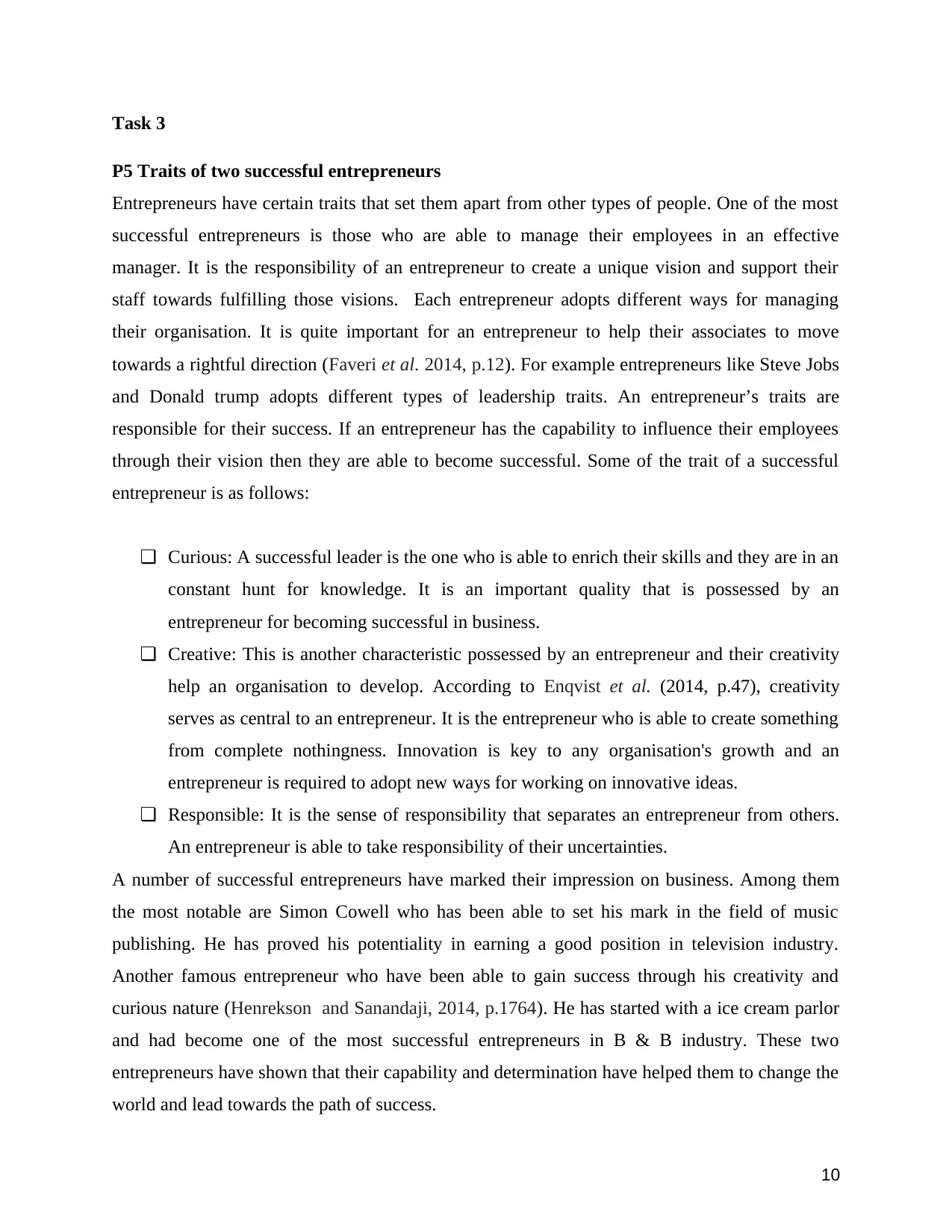
Task 3
P5 Traits of two successful entrepreneurs
Entrepreneurs have certain traits that set them apart from other types of people. One of the most
successful entrepreneurs is those who are able to manage their employees in an effective
manager. It is the responsibility of an entrepreneur to create a unique vision and support their
staff towards fulfilling those visions. Each entrepreneur adopts different ways for managing
their organisation. It is quite important for an entrepreneur to help their associates to move
towards a rightful direction (Faveri et al. 2014, p.12). For example entrepreneurs like Steve Jobs
and Donald trump adopts different types of leadership traits. An entrepreneur’s traits are
responsible for their success. If an entrepreneur has the capability to influence their employees
through their vision then they are able to become successful. Some of the trait of a successful
entrepreneur is as follows:
❏ Curious: A successful leader is the one who is able to enrich their skills and they are in an
constant hunt for knowledge. It is an important quality that is possessed by an
entrepreneur for becoming successful in business.
❏ Creative: This is another characteristic possessed by an entrepreneur and their creativity
help an organisation to develop. According to Enqvist et al. (2014, p.47), creativity
serves as central to an entrepreneur. It is the entrepreneur who is able to create something
from complete nothingness. Innovation is key to any organisation's growth and an
entrepreneur is required to adopt new ways for working on innovative ideas.
❏ Responsible: It is the sense of responsibility that separates an entrepreneur from others.
An entrepreneur is able to take responsibility of their uncertainties.
A number of successful entrepreneurs have marked their impression on business. Among them
the most notable are Simon Cowell who has been able to set his mark in the field of music
publishing. He has proved his potentiality in earning a good position in television industry.
Another famous entrepreneur who have been able to gain success through his creativity and
curious nature (Henrekson and Sanandaji, 2014, p.1764). He has started with a ice cream parlor
and had become one of the most successful entrepreneurs in B & B industry. These two
entrepreneurs have shown that their capability and determination have helped them to change the
world and lead towards the path of success.
10
P5 Traits of two successful entrepreneurs
Entrepreneurs have certain traits that set them apart from other types of people. One of the most
successful entrepreneurs is those who are able to manage their employees in an effective
manager. It is the responsibility of an entrepreneur to create a unique vision and support their
staff towards fulfilling those visions. Each entrepreneur adopts different ways for managing
their organisation. It is quite important for an entrepreneur to help their associates to move
towards a rightful direction (Faveri et al. 2014, p.12). For example entrepreneurs like Steve Jobs
and Donald trump adopts different types of leadership traits. An entrepreneur’s traits are
responsible for their success. If an entrepreneur has the capability to influence their employees
through their vision then they are able to become successful. Some of the trait of a successful
entrepreneur is as follows:
❏ Curious: A successful leader is the one who is able to enrich their skills and they are in an
constant hunt for knowledge. It is an important quality that is possessed by an
entrepreneur for becoming successful in business.
❏ Creative: This is another characteristic possessed by an entrepreneur and their creativity
help an organisation to develop. According to Enqvist et al. (2014, p.47), creativity
serves as central to an entrepreneur. It is the entrepreneur who is able to create something
from complete nothingness. Innovation is key to any organisation's growth and an
entrepreneur is required to adopt new ways for working on innovative ideas.
❏ Responsible: It is the sense of responsibility that separates an entrepreneur from others.
An entrepreneur is able to take responsibility of their uncertainties.
A number of successful entrepreneurs have marked their impression on business. Among them
the most notable are Simon Cowell who has been able to set his mark in the field of music
publishing. He has proved his potentiality in earning a good position in television industry.
Another famous entrepreneur who have been able to gain success through his creativity and
curious nature (Henrekson and Sanandaji, 2014, p.1764). He has started with a ice cream parlor
and had become one of the most successful entrepreneurs in B & B industry. These two
entrepreneurs have shown that their capability and determination have helped them to change the
world and lead towards the path of success.
10
Paraphrase This Document
Need a fresh take? Get an instant paraphrase of this document with our AI Paraphraser
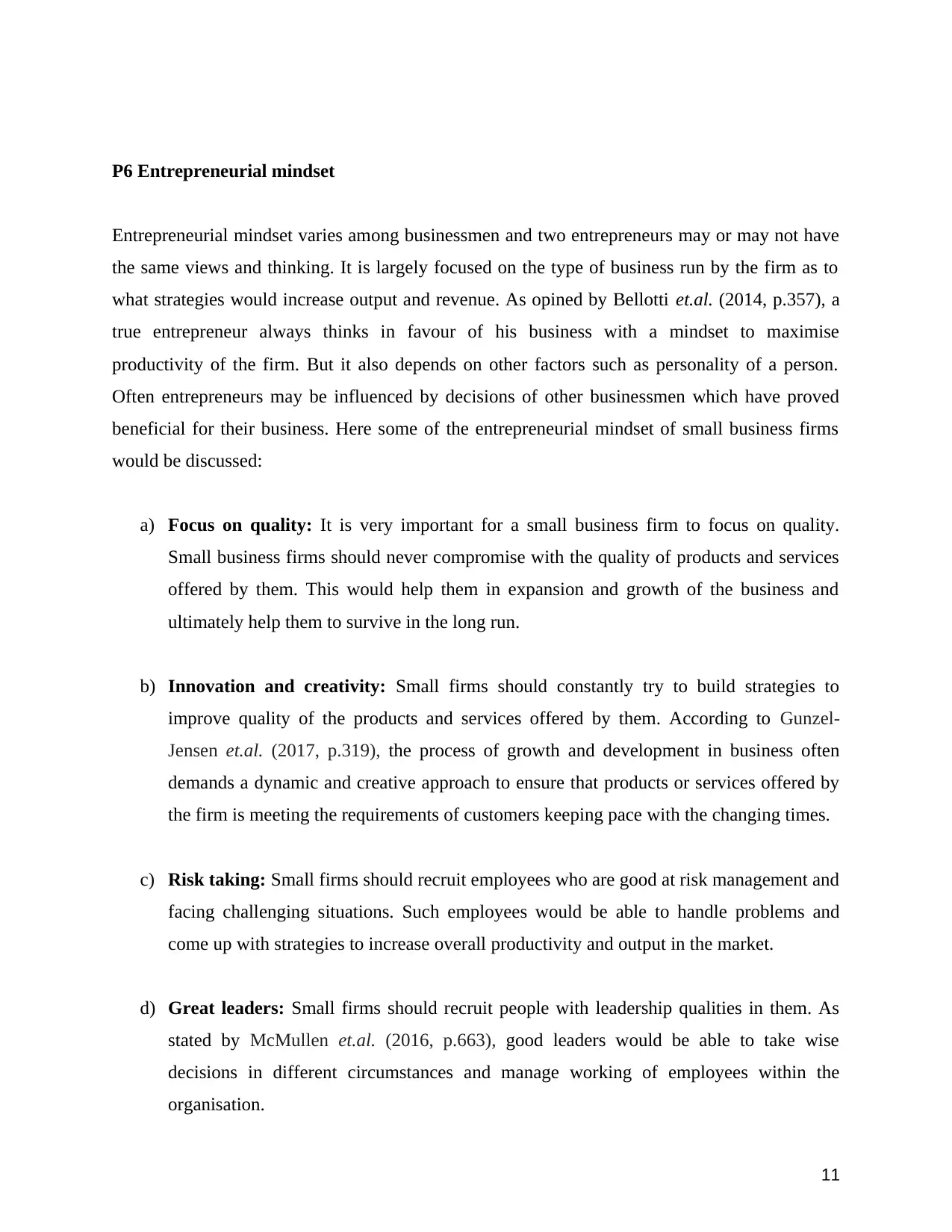
P6 Entrepreneurial mindset
Entrepreneurial mindset varies among businessmen and two entrepreneurs may or may not have
the same views and thinking. It is largely focused on the type of business run by the firm as to
what strategies would increase output and revenue. As opined by Bellotti et.al. (2014, p.357), a
true entrepreneur always thinks in favour of his business with a mindset to maximise
productivity of the firm. But it also depends on other factors such as personality of a person.
Often entrepreneurs may be influenced by decisions of other businessmen which have proved
beneficial for their business. Here some of the entrepreneurial mindset of small business firms
would be discussed:
a) Focus on quality: It is very important for a small business firm to focus on quality.
Small business firms should never compromise with the quality of products and services
offered by them. This would help them in expansion and growth of the business and
ultimately help them to survive in the long run.
b) Innovation and creativity: Small firms should constantly try to build strategies to
improve quality of the products and services offered by them. According to Gunzel-
Jensen et.al. (2017, p.319), the process of growth and development in business often
demands a dynamic and creative approach to ensure that products or services offered by
the firm is meeting the requirements of customers keeping pace with the changing times.
c) Risk taking: Small firms should recruit employees who are good at risk management and
facing challenging situations. Such employees would be able to handle problems and
come up with strategies to increase overall productivity and output in the market.
d) Great leaders: Small firms should recruit people with leadership qualities in them. As
stated by McMullen et.al. (2016, p.663), good leaders would be able to take wise
decisions in different circumstances and manage working of employees within the
organisation.
11
Entrepreneurial mindset varies among businessmen and two entrepreneurs may or may not have
the same views and thinking. It is largely focused on the type of business run by the firm as to
what strategies would increase output and revenue. As opined by Bellotti et.al. (2014, p.357), a
true entrepreneur always thinks in favour of his business with a mindset to maximise
productivity of the firm. But it also depends on other factors such as personality of a person.
Often entrepreneurs may be influenced by decisions of other businessmen which have proved
beneficial for their business. Here some of the entrepreneurial mindset of small business firms
would be discussed:
a) Focus on quality: It is very important for a small business firm to focus on quality.
Small business firms should never compromise with the quality of products and services
offered by them. This would help them in expansion and growth of the business and
ultimately help them to survive in the long run.
b) Innovation and creativity: Small firms should constantly try to build strategies to
improve quality of the products and services offered by them. According to Gunzel-
Jensen et.al. (2017, p.319), the process of growth and development in business often
demands a dynamic and creative approach to ensure that products or services offered by
the firm is meeting the requirements of customers keeping pace with the changing times.
c) Risk taking: Small firms should recruit employees who are good at risk management and
facing challenging situations. Such employees would be able to handle problems and
come up with strategies to increase overall productivity and output in the market.
d) Great leaders: Small firms should recruit people with leadership qualities in them. As
stated by McMullen et.al. (2016, p.663), good leaders would be able to take wise
decisions in different circumstances and manage working of employees within the
organisation.
11
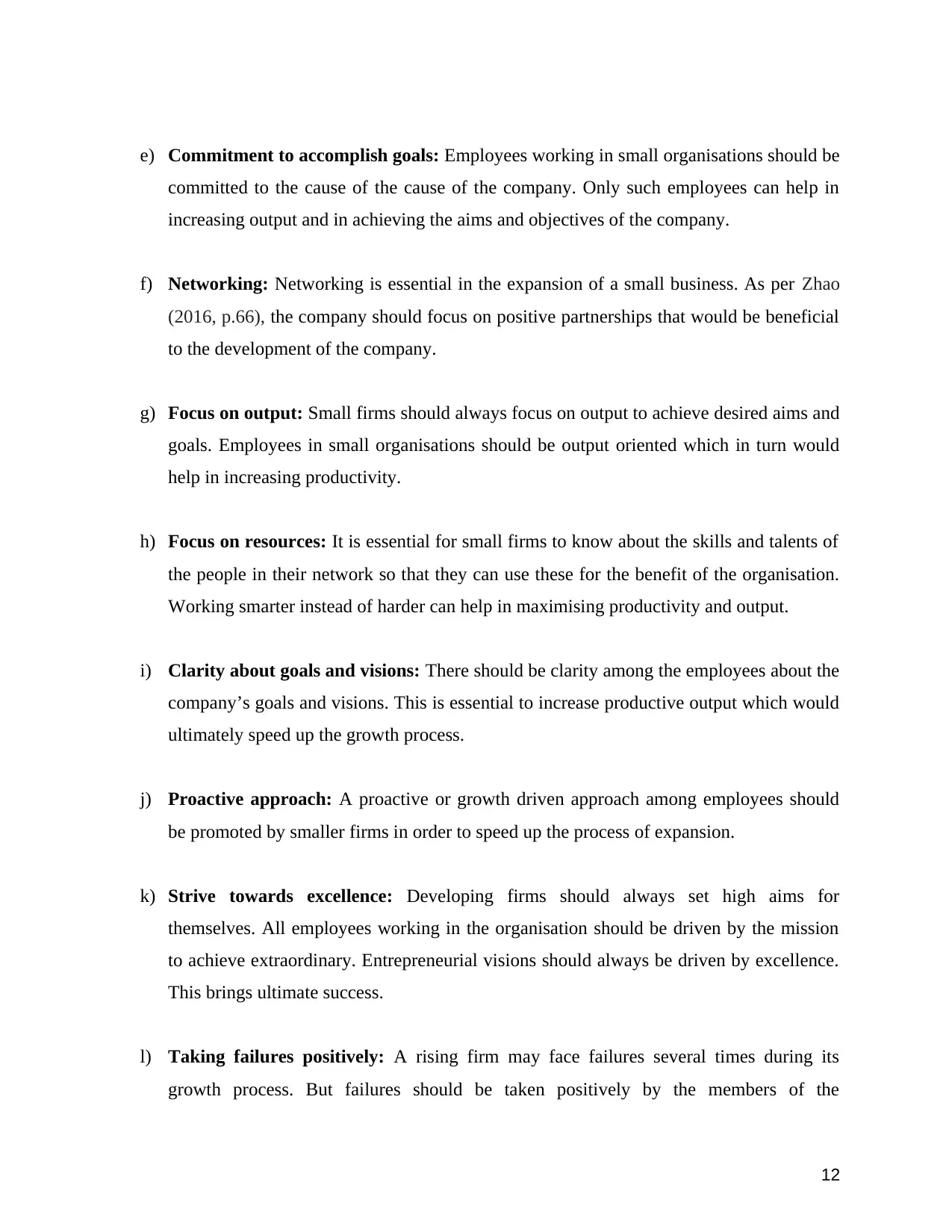
e) Commitment to accomplish goals: Employees working in small organisations should be
committed to the cause of the cause of the company. Only such employees can help in
increasing output and in achieving the aims and objectives of the company.
f) Networking: Networking is essential in the expansion of a small business. As per Zhao
(2016, p.66), the company should focus on positive partnerships that would be beneficial
to the development of the company.
g) Focus on output: Small firms should always focus on output to achieve desired aims and
goals. Employees in small organisations should be output oriented which in turn would
help in increasing productivity.
h) Focus on resources: It is essential for small firms to know about the skills and talents of
the people in their network so that they can use these for the benefit of the organisation.
Working smarter instead of harder can help in maximising productivity and output.
i) Clarity about goals and visions: There should be clarity among the employees about the
company’s goals and visions. This is essential to increase productive output which would
ultimately speed up the growth process.
j) Proactive approach: A proactive or growth driven approach among employees should
be promoted by smaller firms in order to speed up the process of expansion.
k) Strive towards excellence: Developing firms should always set high aims for
themselves. All employees working in the organisation should be driven by the mission
to achieve extraordinary. Entrepreneurial visions should always be driven by excellence.
This brings ultimate success.
l) Taking failures positively: A rising firm may face failures several times during its
growth process. But failures should be taken positively by the members of the
12
committed to the cause of the cause of the company. Only such employees can help in
increasing output and in achieving the aims and objectives of the company.
f) Networking: Networking is essential in the expansion of a small business. As per Zhao
(2016, p.66), the company should focus on positive partnerships that would be beneficial
to the development of the company.
g) Focus on output: Small firms should always focus on output to achieve desired aims and
goals. Employees in small organisations should be output oriented which in turn would
help in increasing productivity.
h) Focus on resources: It is essential for small firms to know about the skills and talents of
the people in their network so that they can use these for the benefit of the organisation.
Working smarter instead of harder can help in maximising productivity and output.
i) Clarity about goals and visions: There should be clarity among the employees about the
company’s goals and visions. This is essential to increase productive output which would
ultimately speed up the growth process.
j) Proactive approach: A proactive or growth driven approach among employees should
be promoted by smaller firms in order to speed up the process of expansion.
k) Strive towards excellence: Developing firms should always set high aims for
themselves. All employees working in the organisation should be driven by the mission
to achieve extraordinary. Entrepreneurial visions should always be driven by excellence.
This brings ultimate success.
l) Taking failures positively: A rising firm may face failures several times during its
growth process. But failures should be taken positively by the members of the
12
⊘ This is a preview!⊘
Do you want full access?
Subscribe today to unlock all pages.

Trusted by 1+ million students worldwide
1 out of 18
Related Documents
Your All-in-One AI-Powered Toolkit for Academic Success.
+13062052269
info@desklib.com
Available 24*7 on WhatsApp / Email
![[object Object]](/_next/static/media/star-bottom.7253800d.svg)
Unlock your academic potential
Copyright © 2020–2025 A2Z Services. All Rights Reserved. Developed and managed by ZUCOL.





